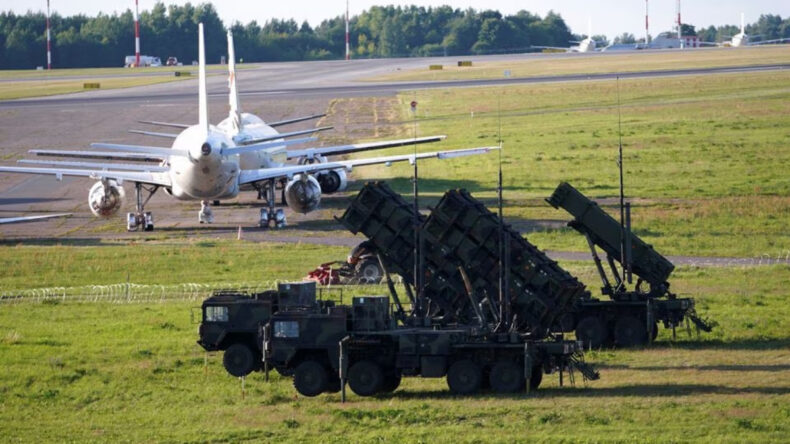Table of Contents
Vilnius, the capital of Lithuania, has been fortified with advanced weaponry by NATO to safeguard the upcoming meeting of alliance leaders, including U.S. President Joe Biden. The city is located a mere 32 kilometers from the razor-wire topped border fence with Belarus, a Russian ally. To protect the summit, around 1,000 troops from sixteen NATO allies have been deployed, with several countries offering advanced air defense systems that the Baltic states currently lack.
Lithuanian President Gitanas Nauseda stressed the importance of securing the skies during the leaders’ gathering, highlighting the imminent arrival of President Biden and leaders from 40 countries. The Baltic countries, which were previously under Moscow’s rule but have been part of NATO and the European Union since 2004, allocate a larger share of their economies to defense, exceeding the majority of other NATO allies.
Germany has contributed 12 Patriot missile launchers, capable of intercepting ballistic and cruise missiles, while Spain has brought a NASAMS air defense system. France is sending Caesar self-propelled howitzers, and military jets from France, Finland, and Denmark will be stationed in Lithuania. Additionally, the United Kingdom and France are providing anti-drone capabilities, and Poland and Germany have dispatched helicopter-enhanced special operations forces. Other countries are sending equipment to handle potential threats involving chemical, biological, radiological, and nuclear incidents.
President Nauseda emphasized the need for permanent air defense in the Baltic states beyond the summit, suggesting the establishment of a rotating force for long-term protection. The collaborative efforts among NATO allies reflect their commitment to ensuring air safety during the summit and addressing future security concerns.
It is evident that the Baltic countries’ defense spending, which surpasses 2% of their economies, is still insufficient to sustain large militaries and develop their own fighter jets and advanced air defense systems. Therefore, the support provided by NATO allies plays a vital role in enhancing the security capabilities of the region.
The upcoming summit serves as a reminder of the collective defense commitment within NATO, as leaders gather to discuss critical issues. The focus remains on securing the airspace, both during the summit and in the long run, to safeguard the Baltic states and promote regional stability.
Vilnius : Enhanced Security Measures
Residents of villages in close proximity to the Belarus border are expressing a strong sense of safety, despite the presence of Russia’s private Wagner militia and nuclear weapons in the region. These locals firmly believe that an attack on Lithuania, as a NATO member, from Belarus or Wagner is highly unlikely due to the strength of the alliance and the protection it provides. They have full confidence in NATO’s capabilities and consider their membership as a guarantee of security. Edvard Rynkun, a 67-year-old resident of Kaniukai village, situated just 1 kilometer from Belarus, confidently stated that NATO’s presence acts as a deterrent against any potential aggression from Belarus. He firmly believes there is no reason to fear the Belarusians.
Elena Tarasevic, another resident of the area at 55 years old, echoed Rynkun’s sentiments and emphasized the crucial role of NATO membership in maintaining regional security. She highlighted the potential consequences if Lithuania were not part of NATO, drawing parallels to the conflict in Ukraine. NATO provides a sense of protection and stability that would otherwise be absent.
In preparation for the upcoming summit, Vilnius airport showcased eight operational Patriot missile launchers operated by Germany. These missile launchers were strategically positioned, with specific directions towards Russia’s Kaliningrad and Belarus. Lieutenant Colonel Steffen Lieb, the commander of the Patriot deployment, stressed the significance of the region’s geography and the need to address potential threats it poses. Lithuania sought protection for the summit, and in response to both Lithuania’s request and NATO’s call for assistance, Germany deployed the Patriot missile launchers.
The presence of these defensive systems and the collaborative efforts among NATO allies reflect their unwavering commitment to ensuring the security of the summit. It underscores the proactive measures taken to counter potential threats originating from the nearby regions. The support provided by NATO allies reinforces Lithuania’s position and strengthens the significance of collective defense. As the summit draws closer, the primary focus remains on maintaining a secure environment for the leaders and participants, with NATO showcasing its preparedness and determination to safeguard the event.
Lithuania Strengthens Border Security
To bolster security during the summer season, Lithuania has significantly increased the deployment of border guards along its borders with Belarus and Russia. The number of guards has been tripled, and additional officers from Latvia and Poland have been called in to provide support. Furthermore, police personnel from these countries have been dispatched to assist with patrols in Vilnius.
These heightened security measures are a proactive response to potential provocations, as stated by Rustamas Liubajevas, the chief of the border guards. He expressed concerns about various scenarios, including waves of migrants attempting to cross the border, border violations, or the unexpected appearance of military vehicles.
In 2021, Lithuania witnessed a significant influx of migrants from the Middle East who entered the country through the Belarus border. Both Lithuania and the European Union believe that these movements were orchestrated by Minsk, although Belarus denies these allegations. Although the number of crossings has decreased since then, the situation remains tense, exacerbated by Russia’s aggression against Ukraine. Liubajevas emphasized that border protection was already at a high level even before the summit.
In preparation for the upcoming summit, border checks have been reintroduced along Lithuania’s borders with Poland and Latvia, which are also European Union borders. These measures have been implemented to ensure enhanced security during the event.













